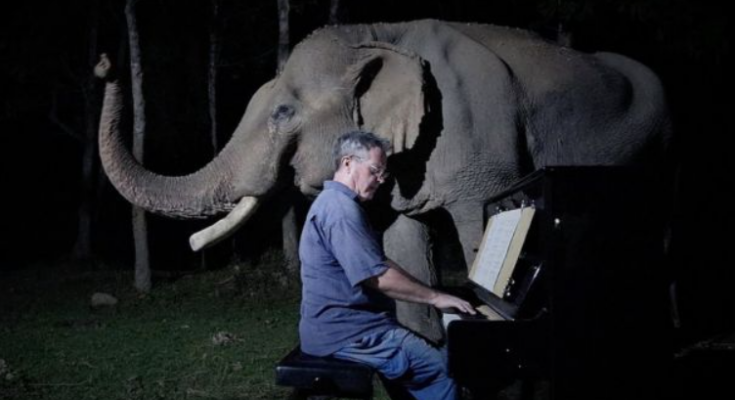Sitting in front of the keys was a talented pianist, whose fingers moved with a smooth and unforced grace. However, this was no ordinary crowd; in front of him was a 61-year-old elephant, a soul scarred by a lifetime of hardship. He was forced to haul wood in the Thai forest, and his body showed the scars of hard work—his right eye was gone, his tusk was tortured, and his frame was disfigured.
But something unexpected happened when the Moonlight Sonata’s opening chords filled the air. The old giant’s eyes softened and his old ears twitched, but he stayed silent. Beethoven’s masterwork became more than simply music at that instant; it was a remedy for a broken soul and a brief respite for a soul that had only experienced suffering. Beethoven may not have anticipated the enormous impact his composition would have on an elephant’s heart.
In the Thai forest, Paul Barton plays Beethoven’s “Moonlight Sonata” for an elderly elephant.

The 61-year-old elephant Mongkol has been confined and has been pulling trees for the majority of his life. Unfortunately, he lost his right eye and tusk as a result of the difficult endeavor. Thankfully, he was saved and taken to Elephants World, where he could spend his remaining years in freedom and tranquility by Thailand’s River Kwai. Mongkol has a particular fondness for music and is renowned for having a delicate and sensitive temperament.
In this moving conversation, self-taught and classically trained performer Paul Barton plays Beethoven’s “Moonlight Sonata” for him. Initially, Barton had spent three months teaching piano at a private school in Thailand. He met his wife here, who is also an animal lover and wildlife artist. The couple made Thailand their permanent home after 22 years of residence.
A beautiful instance of interspecies communication is provided by Paul Barton’s serenade to Mongkol, illustrating the universal appeal of music.



